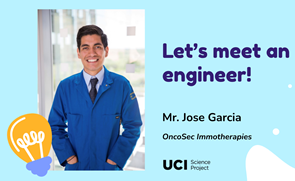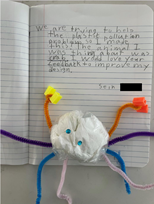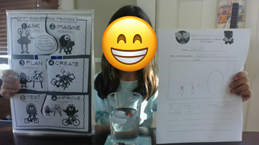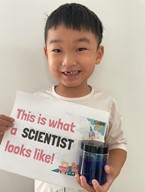Everyone is a Scientist and Engineer
By: Monica Maynard, Allison Desfor, Marianna O’Brien
Edited By: Dr. Kelley Le
May 20, 2021
The Young Engineers & Scientists (YES) Program seeks to introduce elementary school aged children from underrepresented groups to the wonders of science and engineering. Through the YES Program, students are inspired and motivated by highly qualified teachers in partnership with local nonprofits (such as Aquarium of the Pacific, Amigos de Bolsa Chica, and The Ocean Agency), as well as professionals from both UCI and private industry in science and engineering fields as guest speakers. These young students are immersed in activities that focus on critical thinking, collaboration and creativity, and environmental literacy. As students experience the program, they are positioned as capable and knowledgeable scientists and engineers where their bright ideas are valued, heard, and elevated. Students are provided the opportunity to exercise flexibility and agency to generate ideas for solutions to these challenges.
From the start, UCISP Facilitators are paired and work closely with classroom K-5 teachers as co-teachers, to provide meaningful and relevant experiences for all participants. The co-teachers share ideas and best practices throughout the experience to deliver highly engaging experiences where students investigate and explore in fun ways that build their capacity and love of learning. A SAUSD teacher who brought the YES Program back to the classroom for her larger class shared, “My students are enjoying the [YES] program! They look forward to joining the Zoom link everyday. They are so excited to learn more about the ocean and the impact we can make to make it a better place for the animals.”

Within this program, parents/guardians were also able to actively participate and assist in facilitating deeper conversations with their student(s) about the science and engineering topics grounded in environmental issues. One student worked with her godfather to construct her claw modeled after a crab to engage in biomimicry. She was so proud to share her work and thinking. Another student wanted to teach their mom about jellyfish superpowers and excitedly shared with his sibling what he was learning each session. A YES parent shared, “Our son really enjoys this class especially during experiments and building something, which is related to the theme of the class purpose. He talks about something he learned from the class session to us. Especially facts about sea animals. I think this is a great program to teach our younger ones early how to appreciate our environment and to take care of it.”

The YES Program is an science and engineering extension of the regular school day. Co-teachers are challenged and supported to think critically about how to implement the program lessons within their own classrooms. With classroom support from UCISP, co-teachers are able to teach the curricula alongside a Facilitator with their day classes as well. This program allows the co-teachers to become more comfortable teaching science and engineering activities in cross-curricular ways while providing students meaningful reflection and discourse for cultural relevance. Participants of the program learned and engaged in engineering design and the process and nature of science (dispelling the myth of the linear Scientific Method normally taught in schools).

Through the design thinking process, Kindergarteners were able to move from ideation to creation then seek community feedback to troubleshoot and improve their models. For example, on the first day 1st graders were tasked with studying Jacana birds to identify their superpower. Students noticed the bird’s long toes that allow it to walk on water and went on to create a prototype with household materials and a bin of water. One student made her model out of cardboard and sought feedback from another student to help her figure out how to prevent it from getting wet and sinking. A couple of other participants worked together to figure out that putting tape over the cardboard would make it waterproof. Students loved sharing their ideas and creations all the while engaging in science and engineering. This early exposure, positioning, and experience allowed students to have a more concrete understanding of how improvements and communication are fundamental to learning.
By exposing students to relevant topics that challenge our environment and allow them to generate and refine their ideas for solutions they initiate an understanding of the processes necessary to engage in science and engineering. Students are more confident, excited about school, see the relevance of what they are doing, are positioned as experts that are capable of sharing knowledge and asking for feedback, and begin to internalize the idea that they are already young engineers and scientists. By the second day of the program when we ask students to tell us who engineers and scientists are, we hear a resounding, “Me!” We hope that outreach programs like the UCISP YES Program have opportunities to continue into the future with support from the community.

Allison Desfor is a UCI Science Project facilitator, intervention specialist, and teacher leader in the areas of math and science for Redondo Beach Unified School District.
Monica Maynard is a UCI Science Project facilitator, science educator with JPL, and instructional coach for Montebello Unified School District.
Marianna O’Brien is a UCI Science Project facilitator, science educator, and instructional leader for Santa Monica-Malibu Unified School District.
Dr. Kelley Le is the UCI Science Project program director and author of “Teaching Climate Change for Grades 6-12: Empowering Science Teachers to Take on the Climate Crisis Through NGSS (2021).”
